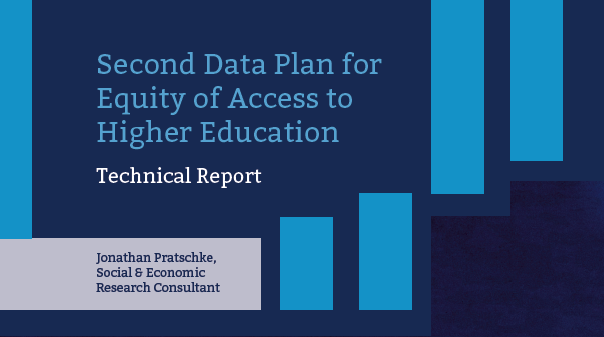
Find information on how to make a Protected Disclosure under the external procedures in place in the HEA.
By James Holohan
Posted: 7 November, 2025

Today, 7 November 2025, the Higher Education Authority (HEA) welcome the publication of the Second Data Plan for Equity of Access to Higher Education (‘second Access Data Plan’) technical report.
The National Plan for Equity of Access to Higher Education 2022-2028 (pdf) (‘National Access Plan’) was published in August 2022, and recognises that students experiencing socio-economic disadvantage may come from various backgrounds and that there is a need to identify data sources to measure participation by these groups. A core commitment in the National Access Plan is to develop a second Access Data Plan that considers ways to collect more reliable data on priority group students.
Dr Jonathan Pratschke, Social and Economic Research Consultant, was commissioned by the HEA to carry out the project which commenced in November 2024. The report includes a systematic review of the international literature on equity of access and an assessment of the priority groups identified in the National Access Plan (2022-2028). Several focus group consultations were held online with key stakeholders, including HEI representatives, advocacy groups, and relevant organisations.
The report’s main recommendations relating to priority group students include continuation of the use of Deprivation Index Scores (DIS) to measure socio-economic composition within the higher education system.
Additional data sources are recommended for data collection on ethnicity and for students with disabilities.
The report recommends accessing and monitoring aggregate data for students with experience of the care system as well as students who are asylum seekers accessing grants through the ‘International Protection Support Scheme’.
Further research is recommended for students who are lone and teen parents before data sources can be further developed.
For certain priority group students outlined in the National Access Plan (2022-2028), such as students with experience of the criminal justice system, students with experience of homelessness, and students who are survivors of domestic violence, the collection of data is not recommended due to ethical and data protection considerations.
Dr Louise Callinan, Head of Access Policy in the HEA, commenting on today’s report said that the publication of the findings is timely as it coincides with the work of the Mid-term Progress Review of the National Access Plan (2022–2028) which is currently underway and due to be published later this year.
“This report highlights the challenges in gathering data on certain priority group students and recommends new approaches to strengthen data collection on student ethnicity and students with disabilities in higher education. Enhancing the quality and breadth of data on equity of access will better support national policy objectives and improve our understanding of progress towards access and inclusion goals. The findings will play an important role in shaping the Mid-term Progress Review of the National Access Plan and provide a strong evidence base to help target supports more effectively for priority group students. I would like to thank Dr Jonathan Pratschke, the project’s Informal Working Group, and all stakeholders who generously shared their time and insights during the consultation process.”
The full report is available on our website (pdf).
Queries can be directed to access@hea.ie.